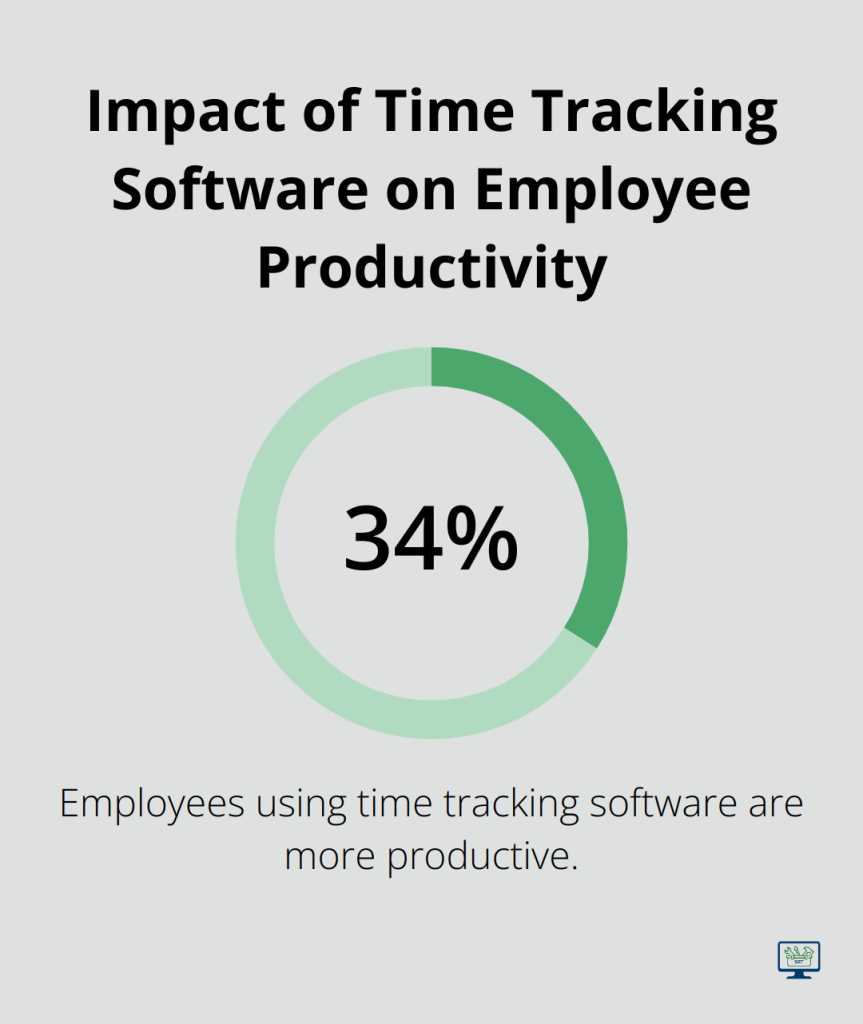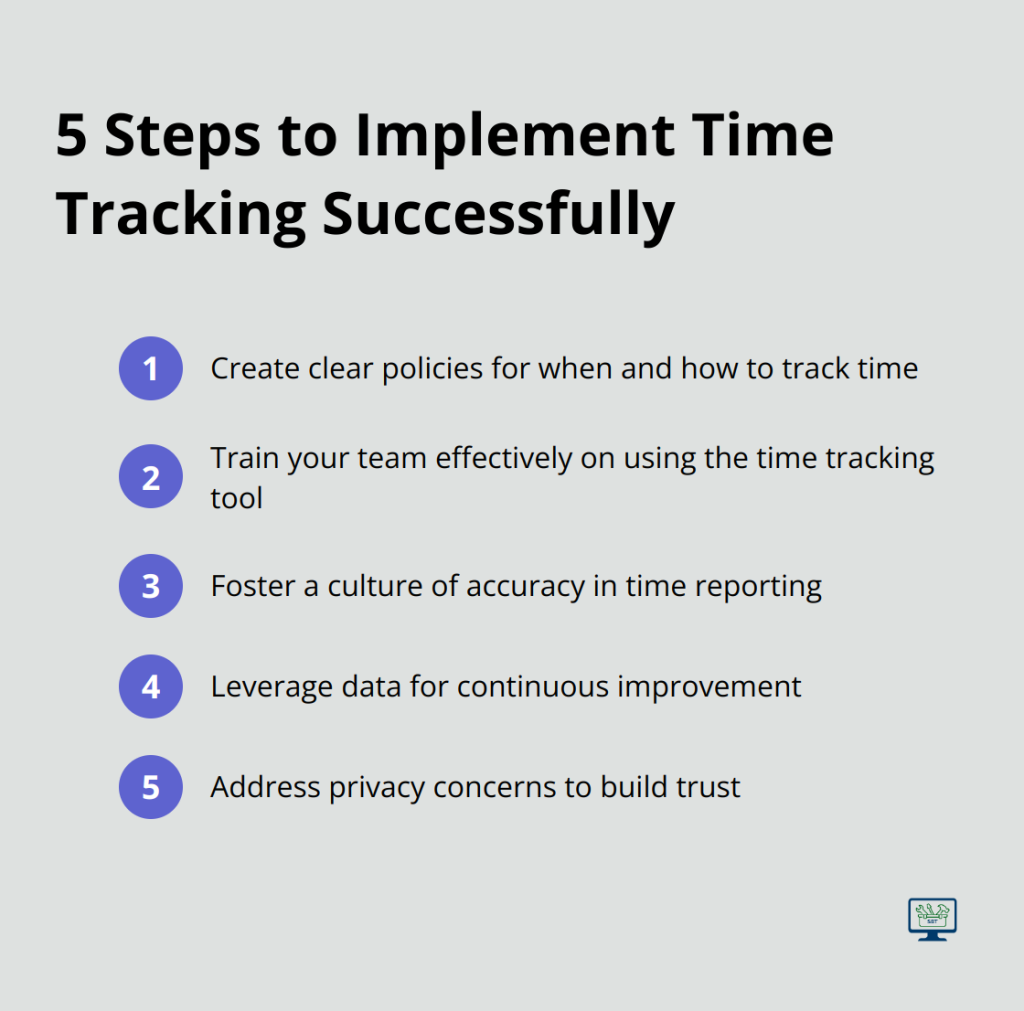Time tracking is a game-changer for small businesses. It’s not just about keeping tabs on hours worked; it’s about unlocking the potential for growth and efficiency.
At SmallBizToolbox, we’ve seen firsthand how effective time tracking can transform operations, from boosting productivity to improving client billing accuracy.
In this post, we’ll show you how to harness the power of time tracking in your small business and reap its many benefits.
Why Time Tracking Is Essential for Small Businesses
Time tracking is more than just a way to monitor employee hours. It’s a powerful tool that can revolutionise how small businesses operate. Let’s explore why it’s so important:
Boost Productivity and Efficiency
Time tracking spotlights how your business spends its most valuable resource – time. When you log hours spent on various tasks, you quickly identify productivity bottlenecks and time-wasting activities. 34% of employees who use time tracking software are more productive than those who do not use it. This boost comes from increased accountability and a clearer understanding of where time goes.

Ensure Accurate Client Billing
For service-based businesses, accurate billing is essential. Time tracking eliminates guesswork and disputes over billable hours. With precise data on time spent on client projects, you can invoice with confidence. This not only improves your cash flow but also builds trust with clients. Automated invoicing can reduce invoice processing time by up to 80%, significantly improving productivity.
Optimise Resource Allocation
Time tracking data provides invaluable insights into how your team’s skills and time are utilised. This information allows you to make informed decisions about staffing, project assignments, and workload distribution. You might discover that your graphic designer spends too much time on administrative tasks, prompting you to reassign those duties and free up their time for more valuable creative work.
Enhance Project Management
Effective time tracking transforms project management. It helps you set realistic deadlines, estimate project costs accurately, and identify potential delays before they become critical. Time tracking tools can help organisations complete more projects on time and within budget compared to those that don’t use such tools.
Improve Decision Making
With accurate time data at your fingertips, you can make better-informed business decisions. You’ll know which projects are most profitable, which tasks consume the most time (and whether they’re worth it), and how to price your services more accurately. This data-driven approach can lead to significant improvements in your overall business strategy.
Time tracking isn’t just about watching the clock – it’s about gaining insights that drive your business forward. Whether you’re a solo entrepreneur or managing a team, implementing effective time tracking can lead to significant improvements in your operations and bottom line.
Now that we understand why time tracking is so important, let’s look at how to choose the right tools for your small business.
Selecting the Best Time Tracking Software
Essential Features for Effective Time Tracking
The right time tracking software can transform your small business operations. User-friendly interfaces and robust reporting capabilities top the list of must-have features. Automatic time capture eliminates manual entry errors and saves precious time. Some of the best timesheet apps in Australia include Connecteam, Deputy, Tradify, Timecamp, Toggl Track, Timely, and Sling.
Integration with project management and accounting software ensures smooth data flow across your business systems. This connexion enhances overall efficiency and provides a comprehensive view of your operations. Some top options for time tracking include Toggl Track for free time tracking, Memtime for simple automated tracking, and TrackingTime for visualizing time differently.

Top Time Tracking Tools for Small Businesses
Several tools stand out for their functionality and ease of use. Toggl Track offers simplicity and powerful reporting features, making it suitable for freelancers and small teams. Its free plan supports up to five users, providing a cost-effective starting point.
Clockify delivers comprehensive time tracking, reporting, and team management capabilities. The free version supports unlimited users and projects, while paid plans include additional features like invoicing and expense tracking.
SmallBizToolBox emerges as the top choice for Australian small businesses. It offers not just time tracking but a complete suite of tools for business growth. Its AI-driven approach and integration with other essential business functions make it a powerful ally for small business owners who want to optimize their operations.
Mobile and Remote Work Considerations
In our mobile-first world, time tracking solutions must offer robust mobile capabilities. Apps that work seamlessly across devices allow team members to track time on-the-go.
For remote teams, GPS tracking and geofencing features prove invaluable. These tools verify that employees are on-site when they clock in, which particularly benefits businesses with field workers or multiple locations. QuickBooks Time, for example, offers basic features like employee hours and attendance tracking, employee scheduling, PTO/leave tracking, and overtime tracking.
The selection of the right time tracking software marks a critical step in optimizing your small business operations. Your choice should align with your specific needs and work style. The next section will guide you through the implementation of time blocking practices to maximize the benefits of your chosen software.
How to Implement Time Tracking Successfully
Create Clear Policies
Establish clear time tracking policies for your small business. Define when and how employees should track their time. You might require time entries to be made daily, with a maximum 15-minute delay. Specify which activities should be tracked, including non-billable work like administrative tasks or team meetings. This clarity prevents confusion and ensures consistent data collection.
Make your policies easily accessible (perhaps in an employee handbook or on your company’s intranet).
Train Your Team Effectively
Don’t assume your team will intuitively understand how to use your chosen time tracking tool. Invest time in proper training. Schedule a dedicated session to walk through the software’s features and your specific tracking requirements. Create short video tutorials for future reference.
During training, emphasize the benefits of time tracking for both the company and individual employees, such as fairer workload distribution and more accurate performance evaluations.
Foster a Culture of Accuracy
Encourage your team to prioritise accurate time tracking. Make it clear that honesty is more important than hitting specific hour targets. Some businesses have found success in gamifying the process, offering small rewards for the most consistent or accurate time trackers.
Regular reminders and check-ins can help maintain this culture of accuracy.
Leverage Data for Improvement
Time tracking data provides a wealth of insights. Use it to identify trends, bottlenecks, and areas for improvement. For example, if you notice certain tasks consistently take longer than expected, it might indicate a need for additional training or process optimization.
Schedule regular reviews of your time tracking data (monthly or quarterly) to drive continuous improvement in your operations.
Address Privacy Concerns
Address any privacy concerns your employees might have about time tracking. Be transparent about how the data will be used and who will have access to it. Emphasize that the goal is to improve overall productivity and efficiency, not to micromanage. This openness can help alleviate any resistance to the new system and foster trust within your team.

Time tracking software helps Australian businesses optimise their operations. These tools help with accurate client billing and provide insights into how time is being spent across different tasks and projects.
Final Thoughts
Time tracking transforms small business operations. It boosts productivity, ensures accurate billing, optimizes resources, and enhances project management. Data-driven insights from time tracking lead to improved business strategies and increased profitability.
The right time tracking software fits seamlessly into your workflow. We at SmallBizToolbox offer comprehensive tools designed to drive growth and efficiency for Australian small businesses. Our platform includes time tracking solutions to help optimize your operations.
Time tracking unlocks potential for growth, efficiency, and success. Start tracking time in your small business today and witness the remarkable achievements possible within the same number of hours. (With clear policies and proper implementation, you’ll maximize the benefits of this powerful tool.)
How useful was this Resource?
Click on a star to rate it!
Average rating 0 / 5. Vote count: 0
No votes so far! Be the first to rate this post.
We are sorry that this post was not useful for you!
Let us improve this Resource!
Tell us how we can improve this Resource?



